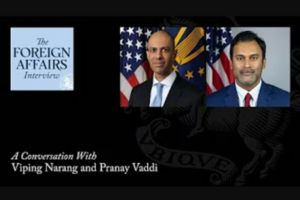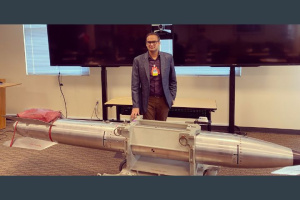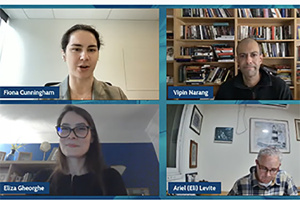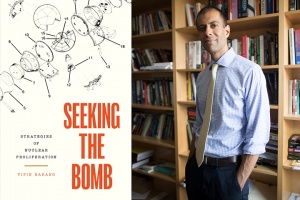
Vipin Narang
Frank Stanton Professor of Nuclear Security and Political Science
Director, Center for Nuclear Security Policy
Nuclear; nuclear proliferation; nuclear strategy; south Asia; international relations; international security.
Biography
Vipin Narang is the Frank Stanton Professor of Nuclear Security and Political Science and the inaugural director of MIT SSP’s Center for Nuclear Security Policy (CNSP). From March 2022 through August 2024, he served as Principal Deputy Assistant Secretary of Defense and then Acting Assistant Secretary of Defense for Space Policy, a portfolio with oversight over the U.S. Department of Defense’s strategic capabilities, including nuclear, space, missile defense, and cyber policy. For his service, he was awarded the Department of Defense Medal for Distinguished Public Service.
His first book Nuclear Strategy in the Modern Era (Princeton University Press, 2014) on the deterrence strategies of regional nuclear powers won the 2015 ISA International Security Studies Section Best Book Award. His second book Seeking the Bomb: Strategies of Nuclear Proliferation was published with Princeton University Press in 2022. His work has appeared in a variety of outlets including International Security, Journal of Conflict Resolution, The Washington Quarterly, International Organization, Foreign Affairs, The Washington Post, and The New York Times. He was the recipient of the 2020 ISSS Emerging Scholar Award from the International Studies Association awarded to the scholar who “had made the most significant contribution to the field of security studies.”
He received his Ph.D. from the Department of Government, Harvard University in 2010. He holds a B.S. and M.S. in chemical engineering with distinction from Stanford University and an M. Phil with Distinction in international relations from Balliol College, Oxford University, where he studied on a Marshall Scholarship. He has been a fellow at Harvard University’s Olin Institute for Strategic Studies, a predoctoral fellow at Harvard University’s Belfer Center for Science and International Affairs, and a Stanton junior faculty fellow at Stanford University’s Center for International Security and Cooperation. His research interests include nuclear proliferation and strategy, North Korea's nuclear weapons, South Asian security, and general security studies.
Research
Narang's research interests include nuclear proliferation, South Asian security, quantitative conflict studies, international relations theory, and general security studies.
Recent Publications
Seeking the Bomb: Strategies of Nuclear Proliferation (Princeton, NJ: Princeton University Press, 2022)
"Sole Purpose is Not No First Use: Nuclear Weapons and Declaratory Policy," War on the Rocks, February 22, 2021 (With Ankit Panda)
“North Korea: Risks of Escalation,” Survival Vol. 62, No. 1 (2022) (With Ankit Panda)
"India's Pangong Pickle: New Delhi's Options After its Clash with China," War on the Rocks, July 2, 2020 (With Christopher Clary)
Technology for Global Security Special Report, A New Framework For Thinking About Regional NC3?, NAPSNet Special Reports, September 19, 2019
"Is A New Nuclear Age Upon Us?" Foreign Affairs, December 30, 2019 (With Nicholas L. Miller)
"Why North Korea Is Testing Missiles Again," Foreign Affairs, May 16, 2019 (With Ankit Panda)
“The Hanoi Summit Was Doomed From the Start,” Foreign Affairs, March 5, 2019 (With Ankit Panda)
Teaching
| 17.418 | Field Seminar in International Relations |
| 17.426 | Empirical Models in International Relations |
| 17.955 | Seminar in South Asian Security |
News
Biography
Vipin Narang is the Frank Stanton Professor of Nuclear Security and Political Science and the inaugural director of MIT SSP’s Center for Nuclear Security Policy (CNSP). From March 2022 through August 2024, he served as Principal Deputy Assistant Secretary of Defense and then Acting Assistant Secretary of Defense for Space Policy, a portfolio with oversight over the U.S. Department of Defense’s strategic capabilities, including nuclear, space, missile defense, and cyber policy. For his service, he was awarded the Department of Defense Medal for Distinguished Public Service.
His first book Nuclear Strategy in the Modern Era (Princeton University Press, 2014) on the deterrence strategies of regional nuclear powers won the 2015 ISA International Security Studies Section Best Book Award. His second book Seeking the Bomb: Strategies of Nuclear Proliferation was published with Princeton University Press in 2022. His work has appeared in a variety of outlets including International Security, Journal of Conflict Resolution, The Washington Quarterly, International Organization, Foreign Affairs, The Washington Post, and The New York Times. He was the recipient of the 2020 ISSS Emerging Scholar Award from the International Studies Association awarded to the scholar who “had made the most significant contribution to the field of security studies.”
He received his Ph.D. from the Department of Government, Harvard University in 2010. He holds a B.S. and M.S. in chemical engineering with distinction from Stanford University and an M. Phil with Distinction in international relations from Balliol College, Oxford University, where he studied on a Marshall Scholarship. He has been a fellow at Harvard University’s Olin Institute for Strategic Studies, a predoctoral fellow at Harvard University’s Belfer Center for Science and International Affairs, and a Stanton junior faculty fellow at Stanford University’s Center for International Security and Cooperation. His research interests include nuclear proliferation and strategy, North Korea's nuclear weapons, South Asian security, and general security studies.
Research
Narang's research interests include nuclear proliferation, South Asian security, quantitative conflict studies, international relations theory, and general security studies.
Recent Publications
Seeking the Bomb: Strategies of Nuclear Proliferation (Princeton, NJ: Princeton University Press, 2022)
"Sole Purpose is Not No First Use: Nuclear Weapons and Declaratory Policy," War on the Rocks, February 22, 2021 (With Ankit Panda)
“North Korea: Risks of Escalation,” Survival Vol. 62, No. 1 (2022) (With Ankit Panda)
"India's Pangong Pickle: New Delhi's Options After its Clash with China," War on the Rocks, July 2, 2020 (With Christopher Clary)
Technology for Global Security Special Report, A New Framework For Thinking About Regional NC3?, NAPSNet Special Reports, September 19, 2019
"Is A New Nuclear Age Upon Us?" Foreign Affairs, December 30, 2019 (With Nicholas L. Miller)
"Why North Korea Is Testing Missiles Again," Foreign Affairs, May 16, 2019 (With Ankit Panda)
“The Hanoi Summit Was Doomed From the Start,” Foreign Affairs, March 5, 2019 (With Ankit Panda)
Teaching
| 17.418 | Field Seminar in International Relations |
| 17.426 | Empirical Models in International Relations |
| 17.955 | Seminar in South Asian Security |





